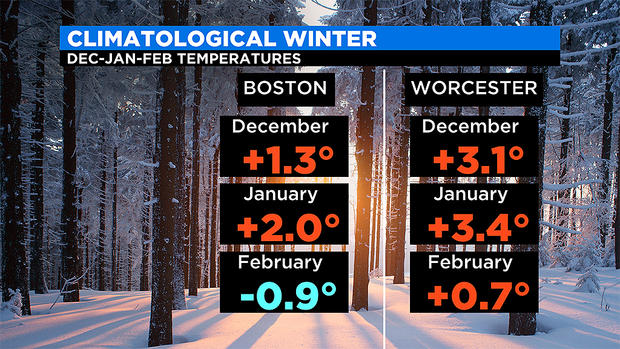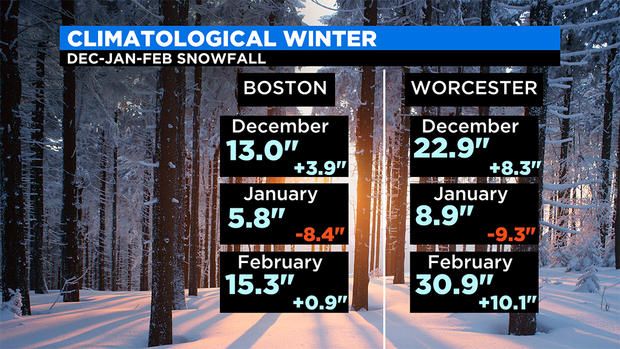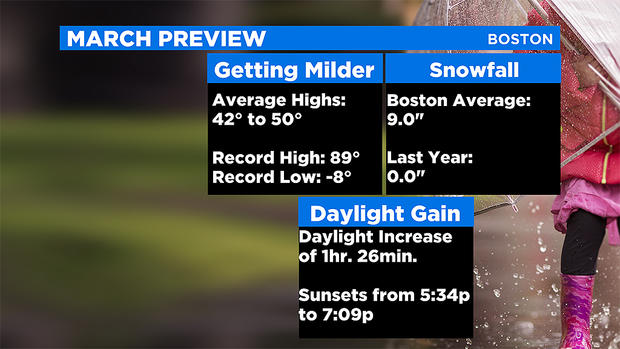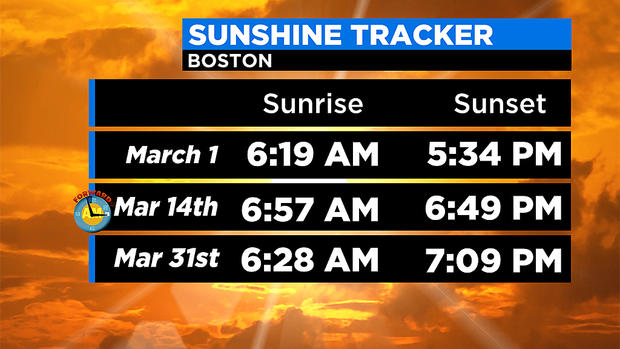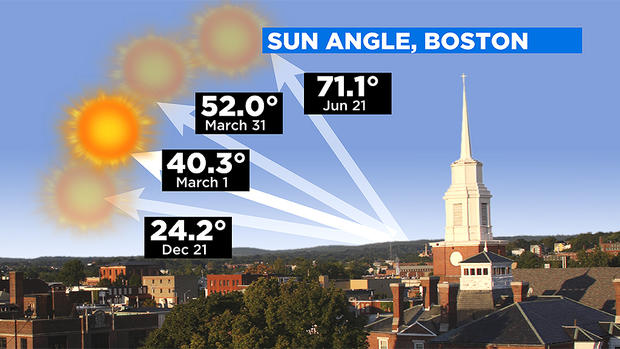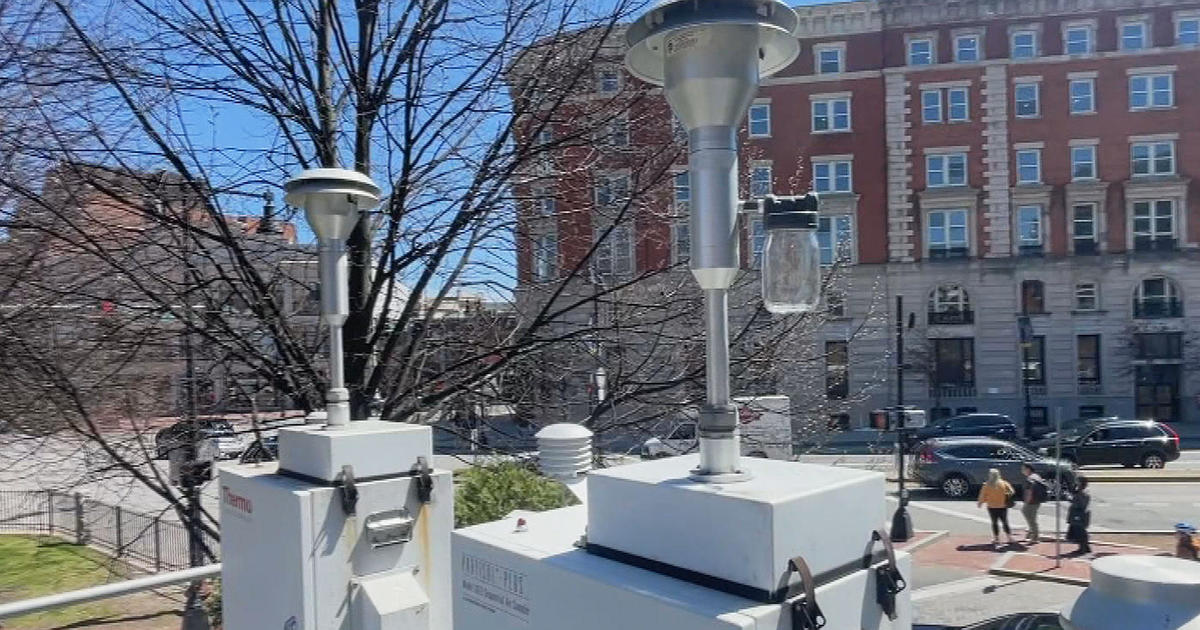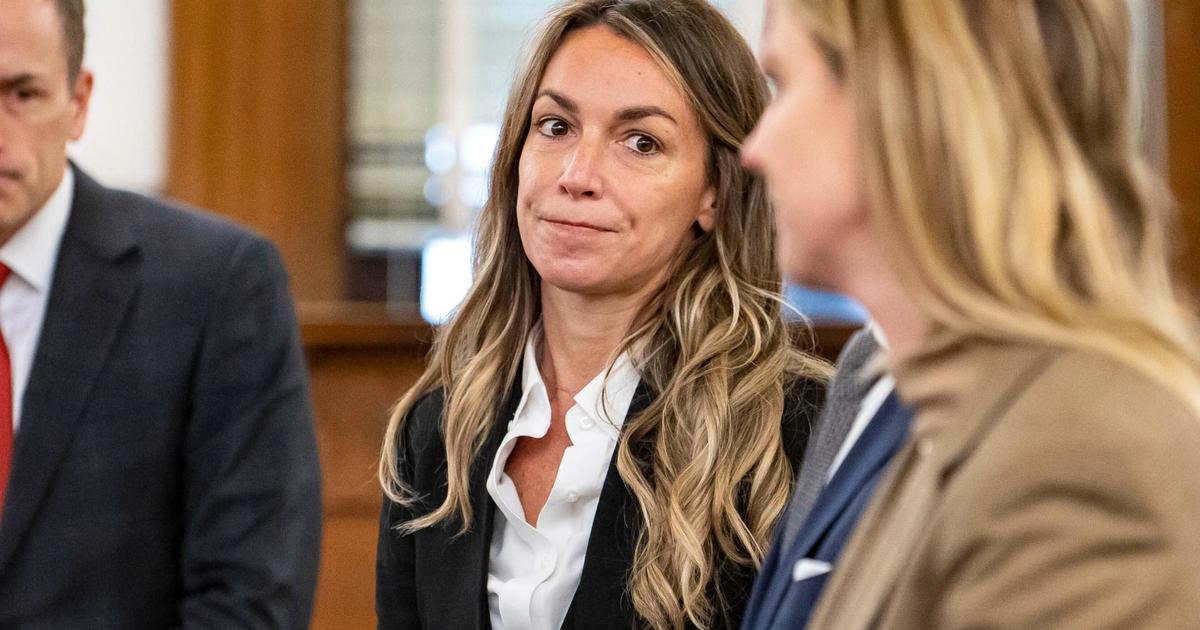It's The First Day Of Meteorological Spring - What Can We Expect In March?
BOSTON (CBS) - Welcome to spring! Yes, Monday, March 1 marks the beginning of meteorological and climatological spring! So, if you have had enough of winter this year, no need to wait for the vernal equinox on March 20, just join us scientists and celebrate today!
Why the difference in seasons? Meteorologists and climatologists group their seasons into 3 months each.
Winter: December through February
Spring: March through May
Summer: June through August
Fall: September through November
This is done largely for accuracy in data collection and forecasting. Having the same dates for seasons each year makes recording and cataloguing data much easier.
Astronomical winter is based solely on the rotation of the Earth around the Sun with the equinoxes and solstices marking the beginning of the seasons.
So, having established this, let's put a bow on the winter of 2020-2021.
I wonder if I were to take a poll, what would the final impressions of this winter be amongst most New Englanders? What would come to mind first when thinking back on this winter? Perhaps those with short-term memories would say cold and snowy (thinking mainly back on the last 4-5 weeks). I am sure there would be some real snow lovers out there who would insist that this winter was rather weak or boring given that we really only had a few "big" snowstorms and a very lackluster January.
Bottom-line I don't think this winter will likely be "remembered" at all years from now, at least not in New England. Folks in Texas and other parts of the Country may disagree.
Sure, compared to the last two winters I suppose this one was "snowy"…
2018-2019: 27.4" of snow in Boston
2019-2020: 15.8" of snow in Boston
2020-2021: 38.4" of snow in Boston
(data includes snow from Oct through Apr)
However, nearly a third of our snow season this year came in that December storm and all of that snow was wiped out by a wet and warm Christmas Eve/Day. Take that storm away and you are left with a season very similar to the last few years. It's also completely local, because outcomes can always be significantly different across our small area. Towns away from the coast have had substantially more snow, but then again they average more snow. The departures from average are about the same everywhere this season.
That Christmas "meltdown" was one of two major turning points in this winter. Wiping the landscape free of snow at the end of December helped lead to a very quiet (some would say boring) and mild January. Had we kept snow cover for a longer period of time, it would have kept a more deep-winter feel for a while just based on the snowy landscape outside our windows. But it also would have modified temperatures, keeping things colder. Instead, we had a streak of 30 consecutive warmer than average days from December 22nd through January 20th, one of the longest such streaks ever recorded in Boston. None of them were particularly noteworthy, but it was about as benign as you can get during mid-winter.
But, just as folks were starting to ask the way-to-early question, "Is winter over?"…we had our second major event and turning point of this winter. In early- January we had what is called a sudden stratospheric warming. Essentially, a very quick and dramatic warming way up in the stratosphere over the Arctic, led to some significant Global weather changes in the following 6-8 weeks. This warming caused the Polar Vortex to split and head south from the Arctic down to the mid-latitudes. Europe and Asia were the first to feel its effects as record breaking cold gripped places like Beijing and Seoul. Same deal in Europe…several major snowstorms and record-breaking cold in the latter half of January.
While the other side of the Globe was digging out, much of the U.S. remained quiet…many began to wonder whether we may escape the Polar Vortex drama this go around. Not to be the case. Winter came back with a vengeance here in late January. Boston didn't get above freezing the last three days of January. And then came the snow…A major snowstorm hit the area on February 1-2, dumping well over a foot in most areas. Downtown Boston was spared from the heavy snow totals, but still recorded snow on 8 out of 10 days between January 26 and Feb 4. The active pattern was set and the rest of February brought storm after storm. New England was spared the worst of the siege as the storm track was largely too far to our south. We found ourselves on the northern fringe of many storms which were bringing record setting snow and ice to places like Texas and the Deep South.
In the end, February finished slightly above average for snowfall in Boston and slightly below average for temperatures, although most other major recording sites in southern New England came in a bit above average for temperatures. Across northern New England, it was one of the warmest winters on record with Caribou, ME and Houlton, ME notching their 3rd warmest on record, St. Johnsbury, VT coming in at 12th, and Burlington, VT at 14th. Temperatures aside, it clearly was the "most wintry" February for us since 2015, though that was an extreme example. Snow cover was a staple of the month when the past few years have featured spring air, 70s, flowers, and even tornadoes. It was a significant change of pace.
The final snow totals for any given season come down to a few storms hitting or missing. If that December snowstorm hadn't occurred, we have another well below average snow season. If a couple of those February storms tracked a bit farther north, we may have been comparing this month to that infamous February of 2015 snow blitz.
And this brings us to our WBZ winter forecast. For those who have been following along, we forecasted above average temperatures this winter and below average snowfall. For the most part this went according to plan…However, we expected La Nina to play a much bigger role this winter than it did. Had it not been for the sudden stratospheric warming and the displacement of the Polar Vortex, we may have nailed it. Those types of events are very unpredictable, but then again, expecting a 3 month forecast to go smoothly would be rather foolish.
Jury is still out on the final snowfall total. If we get another snowless March like last year, Boston will finish about 10" below average. Inland areas would finish very close to/just below their annual average. But like I said, all it will take is one more storm, and our memories (and forecasts) for the winter of 2020-2021 will forever be changed.
So, that begs the question…what is the outlook for March?
Week 1 (this week) looks to be quite chilly overall, particularly Tuesday and then the Friday through Sunday period. Aside from that though, it'll be a dry start to the month with a good amount of sunshine.
There appears to be a "window of opportunity" for some sort of snow or coastal event later this weekend into early next week. However, most of our modeling is currently indicating that the storm track will be way too far south (sound familiar?) for any storms to affect New England. We may just stay cool and dry here for the first 8 days of March.
Early indications are that we could get a significant warmup in the longer range (week 2 and beyond), with La Nina finally flexing its muscles and pumping up the southeast ridge over the eastern U.S.
I'm sure I don't need to remind anyone though that even in some of our warmest March stretches, all it takes is one storm, one cold shot to bring one last snowstorm our way.
The one thing that cannot be denied, the sun. Our days will be getting longer, we gain 86 minutes of daylight in March AND begin Daylight Saving Time on the 14th. Sunset will go from 5:34pm on March 1 to 7:09p by March 31.
The sun will also be getting higher and higher in the sky, going from a max elevation of 40.3 degrees to 52.0 degrees this month alone, meaning any snow that does fall will quickly be eaten alive.
Follow Terry on Twitter @TerryWBZ
